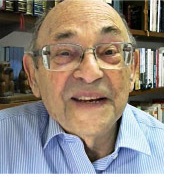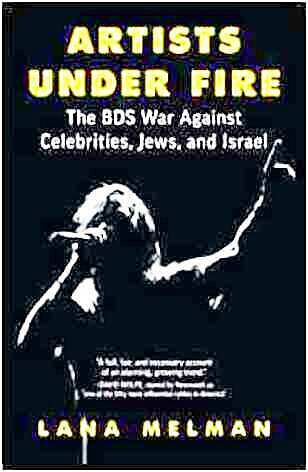Reviewed by Neville Teller
In her new book “Artists Under Fire”, Lana Melman demonstrates how the international movement known as BDS (Boycott, Divestment, and Sanctions) pursues its undeclared aim of delegitimizing and, eventually, eliminating the State of Israel.
BDS, having defined Israel as an apartheid state, maintains that the movement is merely a pressure group advocating the methods once used against apartheid South Africa. It thus provides a respectable cover under which frank antisemites and haters of Zionism can pursue their demonization of Israel. Because BDS is selective in what it says to particular audiences, it attracts support worldwide from people who respond to one aspect or another of its message without appreciating its underlying purpose.
Will you offer us a hand? Every gift, regardless of size, fuels our future.
Your critical contribution enables us to maintain our independence from shareholders or wealthy owners, allowing us to keep up reporting without bias. It means we can continue to make Jewish Business News available to everyone.
You can support us for as little as $1 via PayPal at office@jewishbusinessnews.com.
Thank you.
Melman is concerned particularly with how BDS disseminates and promotes its objectives within the cultural and performing arts sectors. In uncovering the pressures, the dirty tricks and the downright lies the movement uses to dissuade artists with international reputations from performing in Israel, as well as whipping up protests against Israeli artists performing abroad, Melman also provides a picture of how the movement operates across the board, detailing each of the boycott, divestment and sanctions aspects of its activities.
For 20 years Lana Melman was an executive, writer and producer in the movie and TV industry, working for Columbia, Warner Brothers, Paramount and CBS. Since 2011 she has been a leader in the fight against BDS’s anti-Israel cultural boycott campaign. Having founded Liberate Art Inc, an organization dedicated to countering the BDS movement, she has worked with agents and lawyers representing more than 1,000 artists targeted by anti-Israel activists.
“The BDS campaign against Israel,” she writes, “seeks to use the celebrity of artists as a tool to destroy Israel and stir up hate against Jews worldwide.” Her counter-BDS activities, carried out over so many years, have provided Melman with a wealth of unassailable evidence – facts, figures and above all names – which she produces for all to evaluate. Her research is impeccable. At the rear of the volume she supplies her readers with a 27-page section called Endnotes containing no less than 318 references that substantiate all she says about BDS.
In the course of the book she names some celebrities who subscribe wholeheartedly to the BDS movement and actively support its campaigns; she mentions certain artists who intended to appear in Israel but succumbed to BDs pressure and canceled their appearances; and she lists the numerous world-famous artists who refuse to be browbeaten or frightened into canceling visits to Israel and performing before Israeli audiences.
She counts the 2019 Eurovision contest, transmitted from Tel Aviv to the world, one of the major anti-BDS successes. In the lead-up to the event, Melman records, BDS petitioned the Eurovision organization not to hold the event in Israel. Unsuccessful in that, the movement tried persuading participating nations not to attend. When that also failed, they turned to the TV and radio companies and urged them not to carry the show. “And, of course,” writes Melman, “they petitioned international artists to cancel.”
The result? Singers from forty-one countries participated, not a single artist canceled, and the show was transmitted by TV and radio networks worldwide. “BDS’s efforts to thwart the event were a complete failure.”
Eurovision 2019 represented a major victory against BDS. On the other hand Melman is able to chalk up a string of successes by BDS in persuading performing artists to cancel planned performances in Israel. “Never underestimate the intensity of the harassment leveled against artists who want to perform for their Israeli fans,” she writes, explaining how and why some artists finally succumb to the pressure.
“When they are in the crosshairs, artists often feel isolated and overwhelmed. That goes for their representatives as well.” BDS intimidation can extend to actual threats against the life of an artist. Melman provides several instances, and tells us that one lead singer of a heavy metal band canceled a performance saying: “I won’t risk my life in order to perform in Israel.”
Redressing the balance, she devotes a whole chapter to “Artists who support Israel”, providing numerous examples of artists of international status who refuse to be cowed, treat BDS campaigns with contempt, and regularly include Israel in their tours or support Israel in their public statements. Just a few among those named are: Grammy winner Ziggy Marley, Kiss front-man Gene Simmons, musician Alan Parsons, singer Michael Bublé, entertainer Jay Leno, American comedian Bill Maher, singer and actress Vanessa Williams, actor and director Michael Douglas, and acclaimed movie stars Helen Mirren, Arnold Schwarzenegger, Sylvester Stallone, Kelsey Grammer, and Minnie Driver.
In this book, Melman does more than expose the methodology and the ultimate purpose behind BDS. By countering falsehoods disseminated by the movement and laying out facts and figures, she urges everyone, including BDS followers, to question its motives and intentions. Essentially an activist, Melman provides at the end of each chapter a step-by-step action plan for helping to counter it. “Artists Under Fire” is more than informative and thought-provoking. It is positively stimulating.
 The writer is a Middle East correspondent for Eurasia Review. His latest book is: “Trump and the Holy Land: 2016-2020”. Follow him at: www.a-mid-east-journal.blogspot.com
The writer is a Middle East correspondent for Eurasia Review. His latest book is: “Trump and the Holy Land: 2016-2020”. Follow him at: www.a-mid-east-journal.blogspot.com




